Top 10 Magnesium-Rich Foods

Magnesium, a mineral superstar, plays a crucial role in over 300 biochemical reactions in the body. This essential nutrient supports bone health, muscle and nerve function, regulates blood sugar levels, and aids in the production of energy. Despite its significance, many of us struggle to meet our daily magnesium needs through diet alone. In fact, a study found that only 40% of U.S. adults meet daily magnesium intake recommendations, while 45% of Americans are deficient in magnesium.
Low magnesium intake is prevalent since most Americans consume a diet heavy in ultra-processed foods and low in magnesium-rich foods like vegetables, grains, and beans. A magnesium-deficient diet can harm your health in various ways and increase your chance of developing chronic health conditions such as cardiovascular disease.
Fortunately, magnesium can be found in a variety of foods that fit into any dietary preference. Here are 10 delicious and nutritious foods that can help you meet your daily magnesium goal.
Top 10 Food Sources of Magnesium
1. Avocados

A medium avocado provides 58 mg of magnesium, which is 14% of the DV. Avocados are also rich in B-vitamins, vitamin K, potassium and heart-healthy monounsaturated fat. Research has shown that eating avocados may improve cholesterol levels, reduce inflammation and increase feelings of fullness after meals.*
2.Bananas

Bananas are often celebrated for their quick, natural energy boost, but there's more to these yellow fruits than just a high potassium content. They also contain high levels of magnesium. One medium-sized banana provides about 32 mg of magnesium, which contributes to the daily intake recommended by health care professionals. This makes bananas an easy and delicious way to help meet your magnesium needs. Incorporating bananas into your diet can be as simple as enjoying one as a quick snack or slicing it onto your morning cereal or yogurt.
3. Beans and Lentils
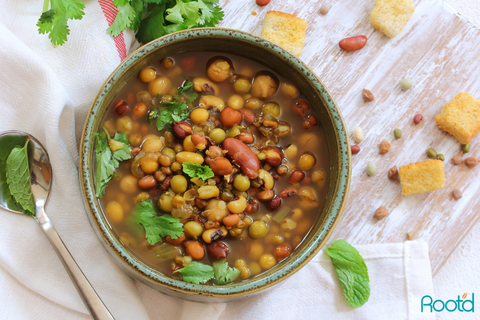
Beans and lentils are fantastic sources of magnesium and plant-based protein. Black beans, kidney beans, lima beans, white beans and lentils are especially rich in this essential nutrient. Other than magnesium, beans and lentils are also high in fiber and B vitamin folate, which is especially vital during pregnancy because of its role in fetal growth and development. A cup of black beans provides 256 mg of folate, or about 42% of the recommended intake for pregnant women.
4. Cocoa Chocolate

Cocoa chocolate is rich in polyphenols (protective plant compounds), providing heart-healthy nutrients and offering a host of health benefits from supporting mood and brain function. It is also an excellent source of magnesium plus other essential minerals like iron, copper and manganese. To optimize the many benefits of dark chocolate choose a product containing at least 85% cocoa solids.
5.Fatty Fish
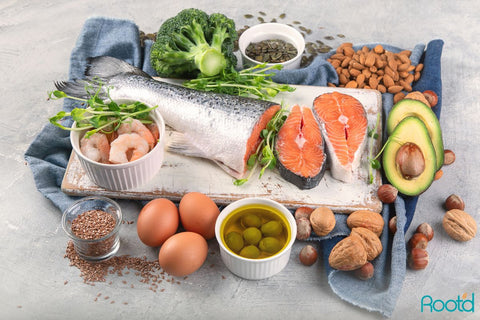
Oily fish such as halibut, mackerel and salmon are high in magnesium. In fact, a 100-g serving of cooked salmon packs a whopping 30 mg of magnesium which is 7% of the DV. It also provides 22 g of high-quality protein. Plus, fish is rich in B vitamins, potassium, selenium and other essential nutrients.
6.Leafy Greens

Green leafy vegetables, such as spinach, kale, collard greens, and Swiss chard, are not only rich in magnesium but also packed with a variety of essential nutrients including vitamins A, C, and K, and dietary fiber. Research found that people who consume diets high in vegetables are less likely to develop chronic health conditions like cancer and heart disease.
Adding leafy greens to your daily diet is easy—they're great in salads, smoothies, or as a simple side dish. Not only do they boost your magnesium intake, but they also add a burst of color and nutrition to your meals, making them both healthier and more enjoyable.
7. Nuts
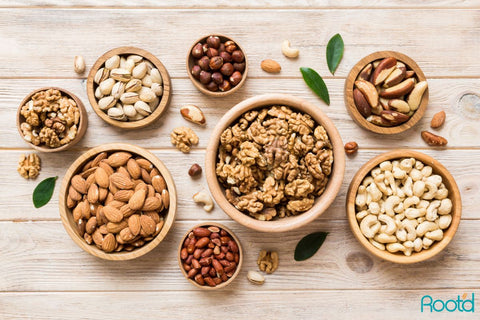
Nuts such as almonds, cashews, and Brazil nuts are rich in magnesium, making them an excellent snack choice for anyone looking to boost their magnesium intake. Eating nuts regularly has been linked to a lower risk of heart disease and can help manage weight by keeping you feeling full longer. They're incredibly easy to incorporate into your daily routine—enjoy them on their own as a snack, sprinkle chopped nuts over salads or yogurt, or use them to add crunch and nutrition to baked goods.
8. Seeds

Many seed varieties including chia, flax and pumpkin seeds contain high amounts of magnesium. These seeds are rich in iron, omega-3 fatty acids and monounsaturated fat. They are also high in fiber and contain antioxidants which protect cells from harmful free radicals produced during metabolism. Flax seeds in particular have been shown to lower cholesterol levels and may have benefits against breast cancer.
9.Tofu
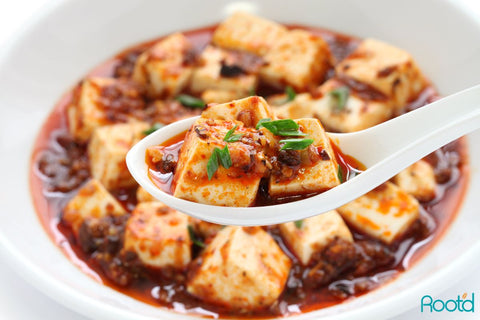
Tofu and other soy products are excellent sources of plant protein and other essential vitamins and minerals including magnesium. A 100-gram serving contains 35 mg of magnesium which is 8% of the daily recommended value. One serving also provides 10 grams of protein and a good amount of iron, manganese, calcium and selenium.
10. Whole Grains
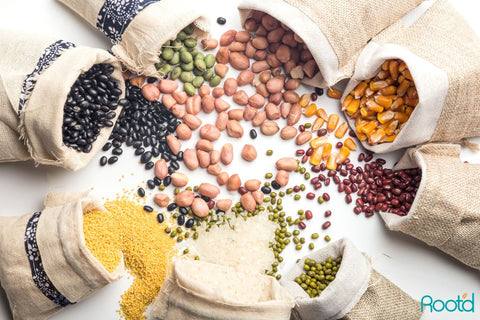
Whole grains are a fantastic source of fiber since they have the complete unprocessed kernel rather than a portion of the grain being processed out, as with refined white grains. As a result, they tend to have higher magnesium content than their refined counterparts. For a magnesium-rich breakfast, switch from white toast to whole grain toast with nut butter.
5 Tips to Maximize Magnesium Absorption
Incorporating magnesium-rich foods into your diet is a step in the right direction, but absorption is key. Here are some tips to maximize your body's ability to utilize magnesium:
-
Limit processed foods: Processed foods are often loaded with phytic acid, which can hinder magnesium absorption.
-
Get enough vitamin D: Vitamin D enhances magnesium absorption. Sunlight exposure or fortified foods can help.
-
Reduce stress: Chronic stress can deplete magnesium levels. Practice relaxation techniques like yoga or meditation.
-
Take Magnesium Supplement: We may get sufficient magnesium from our diets by consuming magnesium rich foods, but certain health conditions can cause nutrient malabsorption, meaning taking magnesium supplements may be necessary for some people. It's also worth noting that although magnesium is naturally found in a variety of foods including fortified foods, some research suggests that magnesium levels may be lower in soils than in the past years, and food processing can reduce magnesium content from plant foods containing the mineral.
-
Choose the right form:When it comes to magnesium supplementation, it's crucial to choose a form with high bioavailability. Among the forms of magnesium, magnesium citrate, used in Root'd, is known for its effectiveness and its role in promoting digestive health. This form is beneficial for those dealing with constipation, often a concern during pregnancy. Root'd contains 50 mg of magnesium citrate, ensuring a gentle and balanced approach to supplementation. Getting too much magnesium may cause abdominal cramps, diarrhea and nausea. Extremely high doses may lead to irregular heartbeat and heart attacks.
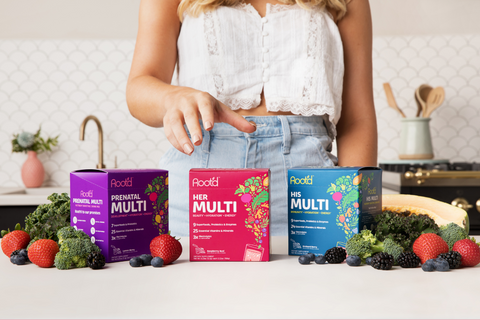
Takeaway
Magnesium is an abundant mineral crucial for many bodily functions, and meeting your daily magnesium intake is essential for preventing magnesium deficiency. Eating a balanced diet that includes the foods listed above can help boost your intake of magnesium.
While magnesium from food is the best source, supplements like Root'd can provide an extra magnesium boost, especially when you're not getting enough from dietary sources. Our MULTIs not only help you meet your daily magnesium goal but also supply your body with other essential vitamins and minerals needed for optimal health. As always, we recommend talking to a healthcare provider before starting any new supplement, particularly if you have any medical conditions or are pregnant.
Ready to try Root'd? Use code MAGNESIUM for 15% off + free shipping on your first order. Shop now!



































Leave a comment